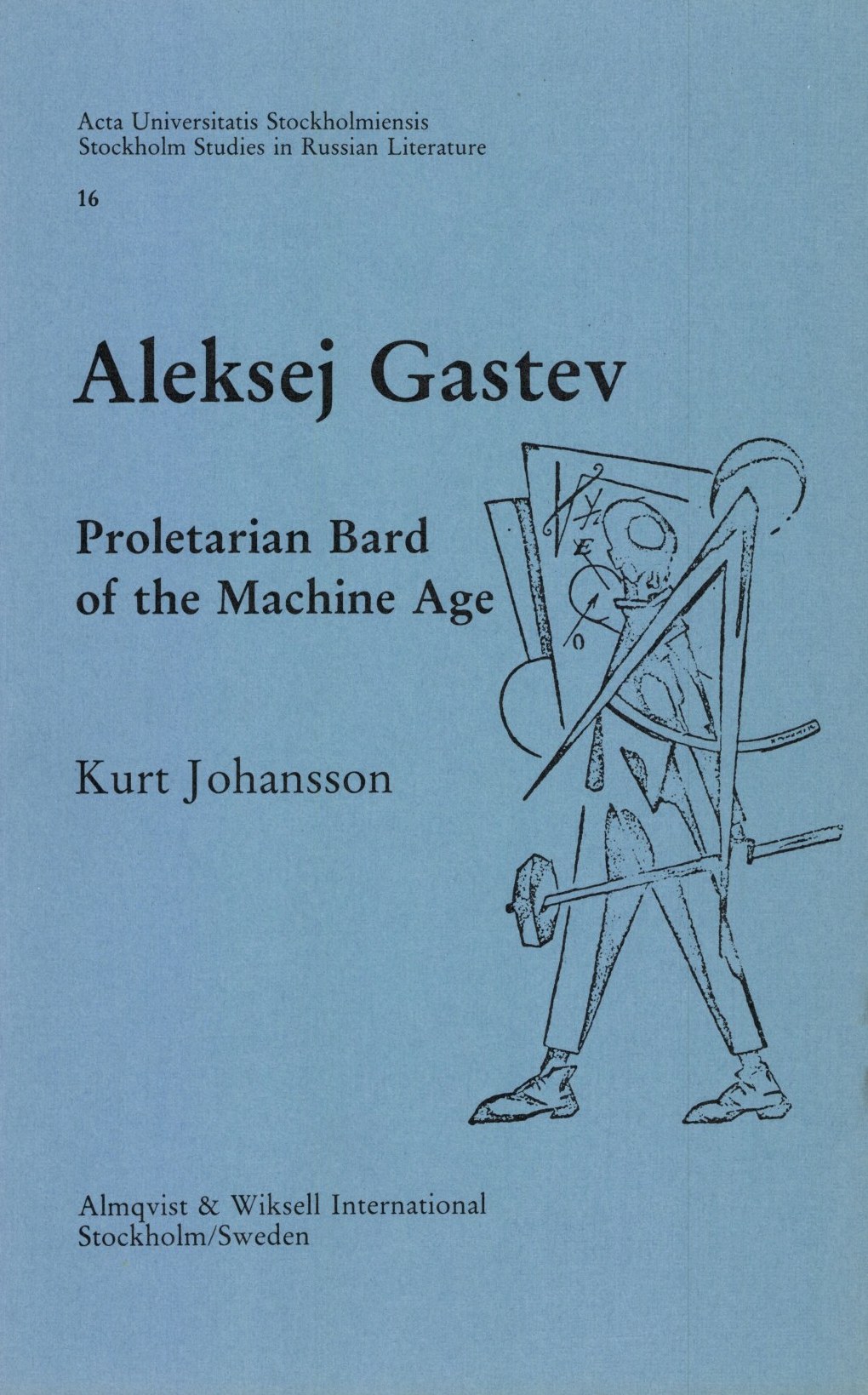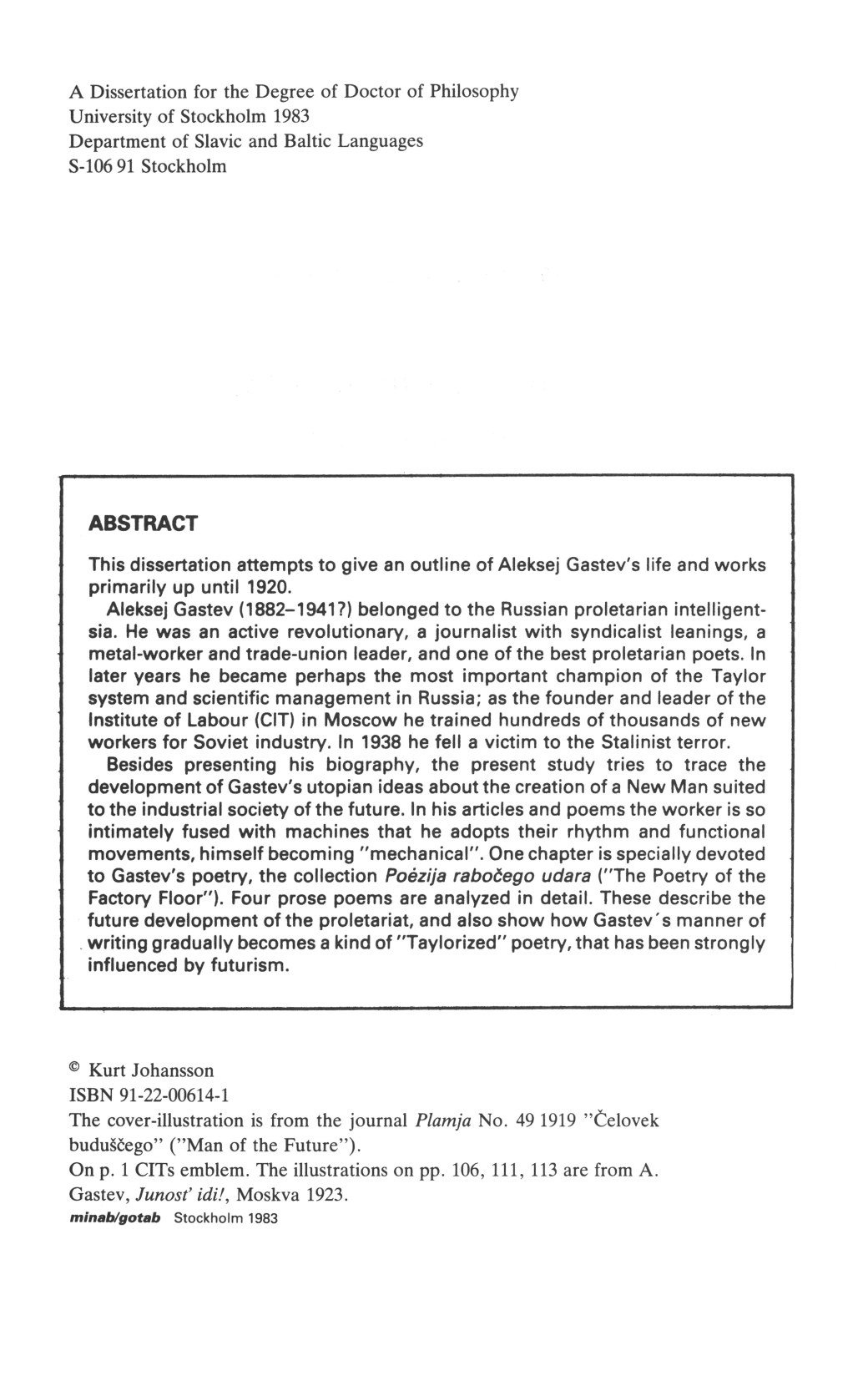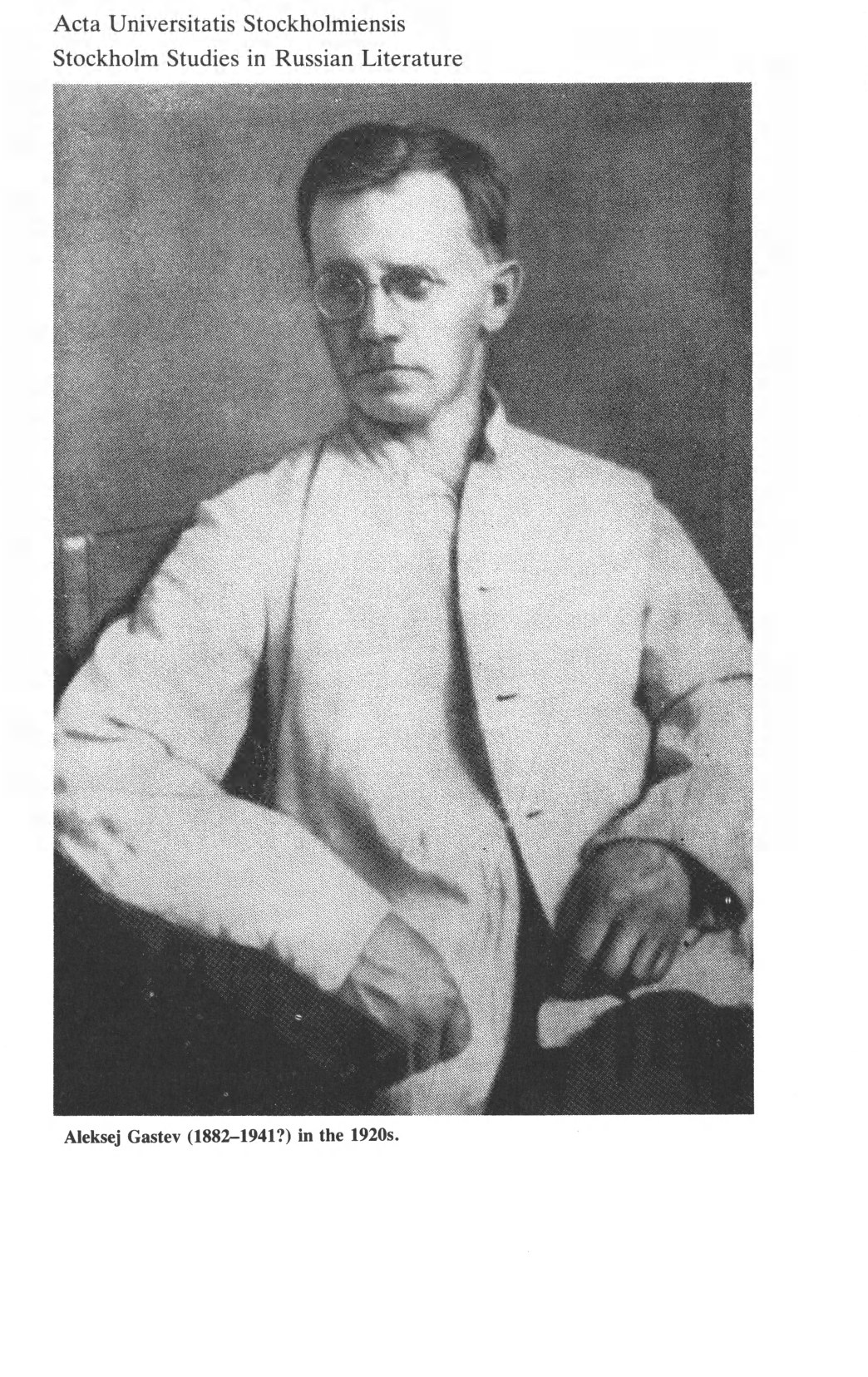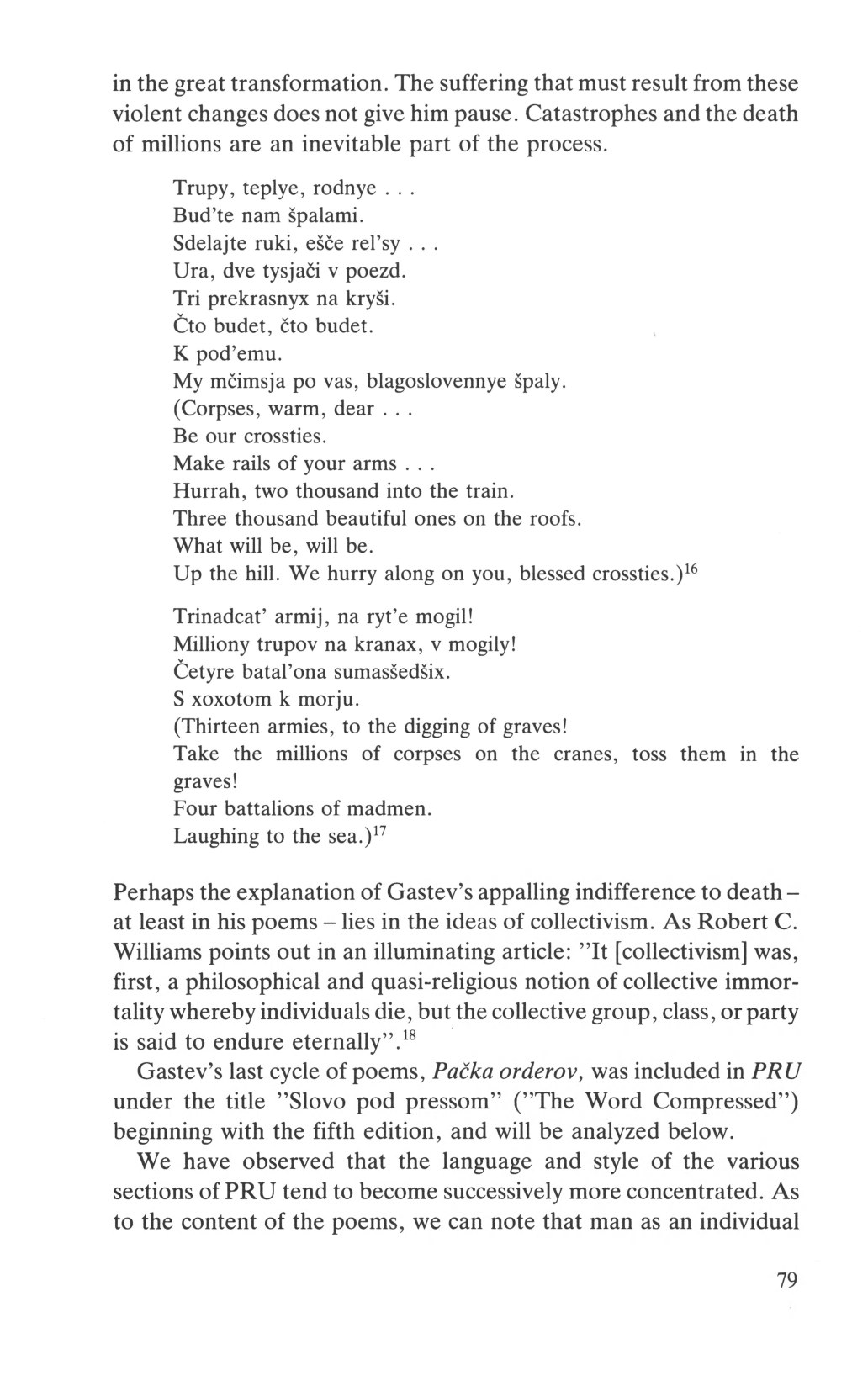|
|
Johansson K. Aleksej Gastev: Proletarian Bard of the Machine Age. — Stockholm, 1983Aleksej Gastev: Proletarian Bard of the Machine Age / by Kurt Johansson. — Stockholm : Almqvist & Wiksell International, 1983. — 170 p., ill. — (Acta Universitatis Stockholmiensis; Stockholm Studies in Russian Literature; 16). — ISBN 91-22-00614-1
A Dissertation for the Degree of Doctor of Philosophy, University of Stockholm, 1983. Department of Slavic and Baltic Languages.
ABSTRACT
This dissertation attempts to give an outline of Aleksej Gastev's life and works primarily up until 1920.
Aleksej Gastev (1882-1941?) belonged to the Russian proletarian intelligentsia. He was an active revolutionary, a journalist with syndicalist leanings, a metal-worker and trade-union leader, and one of the best proletarian poets. In later years he became perhaps the most important champion of the Taylor system and scientific management in Russia; as the founder and leader of the Institute of Labour (CIT) in Moscow he trained hundreds of thousands of new workers for Soviet industry. In 1938 he fell a victim to the Stalinist terror.
Besides presenting his biography, the present study tries to trace the development of Gastev's utopian ideas about the creation of a New Man suited to the industrial society of the future. In his articles and poems the worker is so intimately fused with machines that he adopts their rhythm and functional movements, himself becoming "mechanical". One chapter is specially devoted to Gastev's poetry, the collection Poėzija rabočego udara ("The Poetry of the Factory Floor"). Four prose poems are analyzed in detail. These describe the future development of the proletariat, and also show how Gastev's manner of writing gradually becomes a kind of "Taylorized" poetry, that has been strongly influenced by futurism.
Introduction
More than a hundred years have elapsed since Aleksej Gastev’s birth in 1882. To most people, even in the Soviet Union, his name is nowadays unknown. And yet he was a significant political and cultural figure in the early decades of the twentieth century, first as an active revolutionary and later as a journalist and union leader. By the time of the Revolution in 1917 he had become known as perhaps the most outstanding Russian proletarian poet. It was above all he who introduced Taylorism in Russia, and during most of the 1920s and 1930s he was in charge of training new cadres of workers for Soviet industry. The main reason he has been forgotten is that he fell a victim to Stalin’s terror in 1938 and remained until his rehabilitation in 1956 a non-person who could not even be mentioned, let alone published. Even after that date, however, relatively little has been written about him,1 and as yet he has not received any comprehensive study or biography. Thus the present dissertation is a first attempt to fill that lacuna by outlining his life and works primarily up until 1920.
____________
1. The first time Gastev was published after his rehabilitation was in PP 1959, pp. 148-187. Two editions of PRU have been printed in 1964 and 1971, PRU 1971 being the most complete. These books also contain some of Gastev's non-fictional writings from the 1920s. The collections of his articles based on his work at CIT are as follows: KNR, Kiev 1965; KNR, Moskva 1965. Moskva 1972; TU, Moskva 1973. The 80th anniversary of Gastev's birth was celebrated at Central’nyj Dom Literatorov in Moscow on 22 October 1962. Chairman at the meeting was the proletarian poet G. Sannikov. Speeches were made by Z.S. Papernyj, S.l. Kirsanov, N.M. Baxrax, P.A. Arskij. V.O. Percov, A.M. Berg, F.N. Petrov, V.P. Dolgušev, A. Dunin-Troickij (Stenogramma II). The 90th anniversary of Gastev’s birth was celebrated at the same place on 10 January 1973 with the following participants: A.A. Surkov (chairman), V.O. Percov, M.P. Žuravlev, I.M. Gronskij, K. Johansson, B. Sluckij, S.A. Lučiškin, Ju.A. Gastev, L.M. Suxarebskij, P. Železnov (Stenogramma III). No centenary celebration was held.
Gastev was both a worker and an intellectual, a representative of the so called proletarian intelligentsia. This makes him a relatively uncommon figure among prominent revolutionaries, most of whom had little contact with the workers and the factory floor. His detailed knowledge of conditions in the factories in which he was employed as a metal-worker in both Russia and France, of course, deeply influenced his general outlook and literary works. Everything he wrote is almost exclusively concerned with the proletariat. He himself called the various stages in his development ”laboratories” (in 1927 he distinguished thirteen such stages).2 There is a remarkable continuity here, his experiences in different areas before the Revolution leading directly to his contributions in the 1920s and 1930s, and it is characteristic that he should completely abandon literature in the early 1920s and devote himself entirely to the practical task of teaching the Russian people how to work.3
____________
2. TU 1973, pp. 159-163.
3. Cf. the development of V. Tatlin's group in the early 20s (Gray, p. 244).
Beside presenting his biography, the present study has especially attempted to trace the development of Gastev’s utopian ideas about the creation of a new man suited to the advanced industrial society of the future. His basic attitude was shaped by Černyševskij’s What Is to Be Done? and by socialist literature from around the turn of the century. The ideal man in these works is thoroughly rational, fond of work for its own sake, and selflessly devoted to society and the common weal. He is therefore also predominantly an ascetic who places heavy moral demands on himself and others. Other influences on Gastev’s utopia derived from the general spirit of the times and were reshaped by him in accordance with his own particular experiences and temperament. There is first of all the notion that man functions like a machine and that everything in human life and society can be ordered and systematized much as in the natural sciences. Contemporary representatives of that point of view included Aleksandr Bogdanov in Russia and Frederick Taylor in America — both of whom influenced Gastev — and Jacques Lafitte in France.4 Secondly, there was the so called ”Mythe du Moderne”, with its emphasis on dynamism and speed and its idolization of technology and the machine. Gastev was receptive to the pulse of the new era as expressed in Italian and Russian futurism. In his works man is so intimately fused with machines that he adopts the rhythm and functional movements of the latter and himself becomes ”mechanical”, even in the way he thinks. This is what Gastev calls ”machinism”, and he regards it as a positive feature of a collective society. Thirdly, there is an emphasis on the collective, which of course derives primarily from socialist ideology and was a vital component of A. Bogdanov’s theories. Gastev dreams of a mechanized collective, i.e. well disciplined proletarian masses, that could manage the enormous industrial production of the future rapidly and efficiently. The members of this collective lack all individuality and throw themselves enthusiastically into their labor. Here, thought Gastev, was the precondition for universal harmony and balance.5
____________
4. The French engineer and architect Jaques Lafitte (1884-1966) completed the manuscript of his Reflexions sur la science des machines in 1911, but this work did not appear until 1932. See Susliluoto, pp. 23-24.
5. Cf. E. Zamjatin’s dystopia WE, written in 1920.
Gastev differs as a poet from his proletarian colleagues. He was never really a member of their circle, despite the fact that his collection of poems Poėzija rabočego udara was published in 1918 as the first book of Proletkul’t’s book series. He was a forerunner, a model for the others. Although a number of poets were inspired by his themes, however, no one continued his experiments with free verse, and toward the end of his literary activity he was quite alone in his aspiration to ”technicalize” verbal art itself through a kind of ”Taylorization” of poetry.
Gastev’s biography illustrates the history of the Russian workers’ movement from the turn of the century to the beginning of the 1920s. As an individual he represents a remarkable combination of practical knowledge and visionary aspiration; he was at one and the same time a revolutionary, a pioneer of time and motion studies, and a poet who celebrated iron and machines and considered that poetry could also be treated ”with the chisel of the designer, the wrench of the fitter and the chronometer”.6
____________
6. PRU 1971, p. 14.
The present dissertation is organized as follows: the bulk of the study (chapters 2, 4, 5, 7) is mainly devoted to a chronological account of Gastev’s life and works. Chapter 3 deals with the Russian proletarian and revolutionary colony in Paris, in which Gastev was very active between 1910 and 1913, and also considers the articles he wrote while in France. Chapter 6 is devoted entirely to the collection Poėzija rabočego udara, and contains a detailed analysis of four characteristic poems. The three appendices include a bibliography of Gastev’s works written between 1903 and 1920, the texts of the four poems analyzed in chapter 6, and Gastev’s instruction ”How to Work”.
Table of Contents
1.1. Chronology . 7
1.2. Introduction . 9
2. 1882-1910 .. 12
3.1. The Proletarian Colony in Paris (1910-1913) ... 34
3.2. Gastev's Journalism in Paris .. 43
4. Petersburg and Siberia (1913-1917) . 54
5. Petrograd — the Ukraine — Moscow (1917:1920) ... 57
6. Poėzija rabočego udara ("The Poetry of the Factory Floor") ... 73
7. Moscow (1920-1938) . 104
8. Epilogue .. 116
Notes... 118
Appendix A: Gastev's Published Works 1903-1919 ... 130
Appendix B: The Texts of Four Poems . 136
Appendix C: The instruction "Kak nado rabotat" ("How to Work"). 158
Bibliography . 159
Index of names .. 167
Sample pages
Download link (pdf, yandexdisk; 54,1 MB)
Все авторские права на данный материал сохраняются за правообладателем. Электронная версия публикуется исключительно для использования в информационных, научных, учебных или культурных целях. Любое коммерческое использование запрещено. В случае возникновения вопросов в сфере авторских прав пишите по адресу 42@tehne.com.
3 июля 2018, 14:46
0 комментариев
|
Партнёры
|










Комментарии
Добавить комментарий